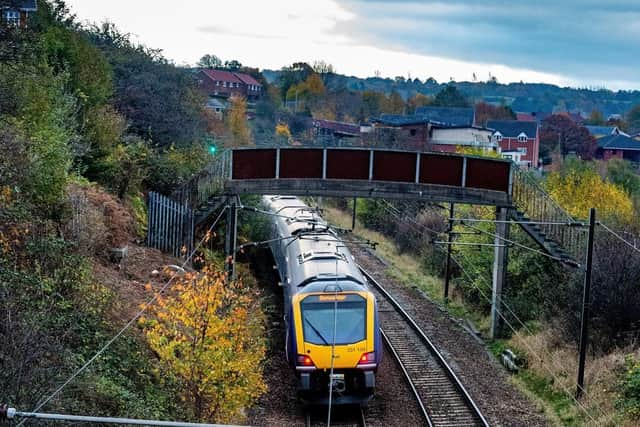Rail strikes are holding the public to ransom and Grant Shapps doesn't help - Jayne Dowle
I think we all know that in our own region, that’s a median annual income which a lot of people won’t recognise and will likely never see in their entire lifetime.
It does make me wonder what kind of cause the National Union of Rail, Maritime and Transport Workers (RMT) thinks it holds to call three 24-hour strikes in a week at the end of this month, although it’s citing below-inflation pay rises, job cuts and poor conditions.
Advertisement
Hide AdAdvertisement
Hide AdA salary of £44,000 is far more than many teachers and nurses earn, and with none of the attendant stress of nurturing and caring for others, as anyone who has travelled recently by train will attest.


It’s hardly a pleasant experience for your money; I’ve just checked and the price of an on-the-day return from Barnsley to London today is £82 and that’s off-peak. The unions don’t set the actual ticket prices but the balance sheets have to add up; high wages equals high fares. In the end, passengers suffer from ridiculously-high travelling costs and reduced services, which is hardly going to endear them to the cause of an industry which received £16bn of public money during the pandemic.
On the way back from London the other weekend, travelling by LNER from Kings Cross to Doncaster, I was baffled and not a little perturbed by a loudspeaker announcement at the start of the journey.
The seat-back app system for ordering drinks and food, Let’s Eat at Your Seat, was not working, we were informed, followed by what sounded to my ears like a load of gobbledegook about smartphones, QR codes and downloading apps. I was struggling to make sense of it, and I’m relatively tech-savvy, but the gist seemed to be that the simple act of ordering a cup of tea from a trolley on a train is on the way out. I thought of my parents, who would have even less understanding than me, and how the last thing they would want to do on any form of public transport would be to divulge their credit card details.
Advertisement
Hide AdAdvertisement
Hide AdGiven that there must be millions of travellers, including the elderly, disabled and young families, who would find it difficult if not dangerous to negotiate the buffet car and return to their seats safely carrying hot drinks and food in a packed inter-city train, I thought that this sounds like a particularly shabby “improvement”.
The whole industry, it seems to me, is riven with resentment and anger, not helped by the fact that during the pandemic, the Prime Minister and his Transport Secretary, Grant Shapps, effectively brought most of the railways back into public ownership and the Government is now busily dismantling Network Rail, to be replaced by a new body, Great British Railways (GBR).
If it wasn’t so serious, its new name would be hilarious. Train crews bringing the country to a halt in the middle of summer is hardly the best advertisement for post-Brexit Britain. Especially now that Aslef, representing train drivers, and the Transport Salaried Staffs’ Association (TSSA), of non-driving staff, have agreed to join strike action. And industrial discontent is spreading.
It’s reported that members of the GMB and Unite unions working for British Airways at Heathrow are voting on action. And a ballot of 115,000 members of the Communication Workers Union working for Royal Mail and 40,000 at BT will begin on Wednesday. The new railway ownership arrangement means that the RMT and other unions must now negotiate directly with the Department for Transport. It’s clear that union leaders are ramping it up as a test of strength, with passengers caught in the middle.
Advertisement
Hide AdAdvertisement
Hide AdI would like to add the caveat that of course, there will be railway employees who earn far less than £44,000.
However, it is pretty much universally agreed that this is an industry where opportunities for progression and pay increases are better than most; try carping about job security and pay to someone order-picking in a warehouse on a zero-hours contract on absolutely the minimum wage. If RMT members really cared about workers’ rights, they would care about all workers – especially those who rely on the train to get to their jobs.
We are recovering from a pandemic; we need to pull together, not suffer further division. Many of us will totally understand and sympathise with the evident distrust and despair at the performance of the Conservative government. But holding the public to ransom is not the way to bring about positive change.
Let the unprincipled politicians in Downing Street carry on digging their own graves. Advocating strike action this summer to cause a fight is at best irresponsible, at worst reprehensible.
Comment Guidelines
National World encourages reader discussion on our stories. User feedback, insights and back-and-forth exchanges add a rich layer of context to reporting. Please review our Community Guidelines before commenting.